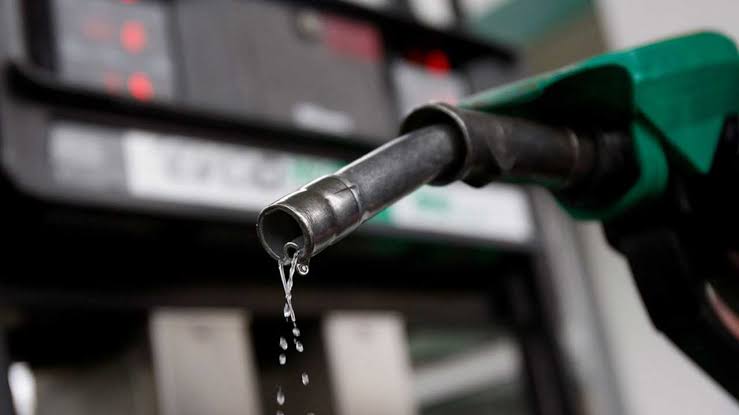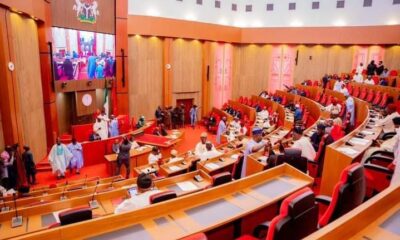Oil
FG To Crack Down On Unlicensed Petroleum Product Dealers

The Nigerian Midstream and Downstream Petroleum Regulatory Authority issued a warning on Monday, stating that starting from June 1, 2023, unlicensed petroleum product dealers will not be permitted to load products.
The announcement was made during a stakeholders’ engagement on gas utilization held in Abuja.
The Federal Government emphasized that it is determined to shut down such businesses, and henceforth, obtaining a license will be a prerequisite for engaging in the trade of petroleum products.
The government firmly stated that without a valid license, no loading of any petroleum product will be allowed.
The objective of the engagement was to enlighten operators on the need to urgently obtain the requisite petroleum storage licence and to engender the transition from white products to gas.
“No licence, no loading. We still have like nine days to do the right thing and comply. As the scripture says, obedience is better than sacrifice. As a regulator we prefer that people comply so that it doesn’t have adverse effects on your businesses.
The Executive Director, Distribution Systems, Storage and Retailing Infrastructure, NMDPRA, Ogbugo Ukoha, stated “If there is no compliance, we can assure you from the authority that from 1st of June, there will be no licence, no loading. Any depot, any licensed operator who supplies petroleum products to an unlicensed facility, we will shut down that operator.
“I want to make a special appeal that anybody who wants to handle petroleum products in excess of 500-litre storage, is required to obtain a licence. Our licensing procedure includes going through what your equipment is, the distance, hazards, procedures and everything.” he added.
During the engagement, Ukoha, a representative from the Nigerian Midstream and Downstream Petroleum Regulatory Authority, encouraged operators to capitalize on the emerging opportunities within the gas value chain. He urged them to adapt their energy requirements to incorporate gas derivatives.
Ukoha specifically highlighted several gas derivatives, including Liquefied Natural Gas (LNG), Liquefied Petroleum Gas (LPG), Compressed Natural Gas (CNG), Autogas, propane, and butane.
He emphasized that investing in these derivatives would serve as a safeguard against potential future uncertainties in the global supply of petrol and diesel.
Okoha said the authority’s 12 gazetted regulations had defined the licensing regime, procedures and standards for handling petroleum products, which when breached posed increased risks.
Earlier, the authority’s Chief Executive Officer, Farouk Ahmed, said the Federal Government had put in place various initiatives and policy frameworks including the National Gas Expansion Programme and the Decade of Gas Programme to deepen the use of gas in Nigeria.
“It is our hope that this engagement will create the necessary awareness and make the compelling case for industry operators to foster a compliance culture, which alone guarantees safer and sustainable facilities,” Faouk, who was represented by the Executive Director, Health, Safety, Environment and Community, NMDPRA, Mustapha Lamorde, stated.
In his remarks, Ukoha highlighted the significance of the Midstream and Downstream Gas Infrastructure Fund, which was established under the provisions of the Petroleum Industry Act of 2021.
He emphasized that this fund would play a pivotal role in stimulating investments in the gas sector noting that the ongoing efforts to expand gas infrastructure were already demonstrating positive outcomes.
However, he stressed the need for increased collaborations to further enhance the utilization of domestic gas resources.
Oil
NNPC Targets 60% Methane Emission Reduction By 2031
The Nigerian National Petroleum Company Limited (NNPC) has unveiled a bold strategy to reduce methane emissions in the oil and gas sector by 60% by 2031, with an ultimate goal of achieving net-zero emissions by 2060.
This announcement reinforces Nigeria’s leadership role under the Global Methane Pledge initiative and its commitment to tackling climate change.
The Group Chief Executive Officer of NNPC, Mele Kyari, disclosed these plans during a meeting on Thursday with Robert Leahman, the U.S. State Department’s Global Methane Program Manager, and a delegation from Deloitte.
READ MORE: Atiku Gloats Over AUN’s Achievements Ahead Of 20th Anniversary
The discussions, held at the NNPC Towers in Abuja, focused on collaborative efforts to reduce methane emissions through innovative and sustainable practices.
“Reducing methane emissions is not just an environmental necessity but also a strategic imperative for Nigeria’s energy transition. We are leveraging partnerships to adopt global best practices and innovative solutions,” Kyari stated.
Key among these efforts is a pilot project in the Niger Delta, aimed at establishing emissions baselines, mitigating methane leaks, and promoting sustainable operations across Nigeria’s energy sector.
The project, a partnership between NNPC, Deloitte, and the U.S. Bureau of Energy Resources, will utilize data-driven methodologies to pinpoint and address methane hotspots.
Robert Leahman commended Nigeria’s proactive stance, describing it as a benchmark for other nations on the continent.
“Nigeria’s leadership under the Global Methane Pledge sets a standard for the continent. These initiatives will not only help reduce emissions but also drive sustainable development in the energy sector,” he said.
Kyari highlighted the broader benefits of addressing methane emissions, noting its significance for both environmental protection and economic efficiency.
“This collaboration is a game-changer. By addressing methane leaks, we’re reducing waste, saving costs, and protecting the environment. It’s a win-win for our economy and the planet,” he added.
Oil
FG Introduces New Incentives To Revitalize Nigeria’s Oil & Gas Industry
In a strategic move to revitalize Nigeria’s oil and gas sector, the Federal Government has unveiled two key fiscal incentives aimed at attracting investment and enhancing energy security.
The announcement was made by Mr. Wale Edun, the Minister of Finance and Coordinating Minister of the Economy on Wednesday.
The first initiative, the Value Added Tax (VAT) Modification Order 2024, introduces critical exemptions for essential energy products and infrastructure, including Diesel, Feed Gas, Liquefied Petroleum Gas (LPG), Compressed Natural Gas (CNG), Electric Vehicles, Liquefied Natural Gas (LNG) infrastructure, and Clean Cooking Equipment.
Read Also: Atiku Calls For Rotational Presidency Across Nigeria’s Geopolitical Zones
These exemptions are designed to reduce living costs for Nigerians, promote energy security, and accelerate the transition to cleaner energy alternatives.
The second initiative, the Notice of Tax Incentives for Deep Offshore Oil & Gas Production, offers new tax relief options for deep offshore exploration projects.
This measure aims to position Nigeria’s deep offshore basin as a premier destination for international oil and gas investments, boosting the country’s appeal to foreign investors.
These reforms are part of a broader set of policy initiatives, known as Policy Directives 40-42, endorsed by President Bola Ahmed Tinubu.
The directives reflect the administration’s commitment to fostering sustainable development in the energy sector and enhancing Nigeria’s competitive edge in the global oil and gas market.
Business
Tinubu set to approve ExxonMobil-Seplat oil deal, expands CNG bus initiative

By Yemie Adeoye
NIGERIA’s President Bola Tinubu has announced that the protracted ExxonMobil-Seplat upstream oil divestment will be formally approved by the Minister of petroleum within a matter of days, just as he announced his government’s intention to expand the Compress natural Gas, CNG buses initiative.
The President who stated this during his Independence day nationwide broadcast stated that the move is in line with his administration’s commitment to free enterprise, free entry and free exit in investments which is the hallmark of his administration investment policy.
“Fellow compatriots, our administration is committed to free enterprise, free entry, and free exit in investments while maintaining the sanctity and efficacy of our regulatory processes. This principle guides the divestment transactions in our upstream petroleum sector, where we are committed to changing the fortune positively. As such, the ExxonMobil Seplat divestment will receive ministerial approval in a matter of days, having been concluded by the regulator, NUPRC, in line with the Petroleum Industry Act, PIA. This was done in the same manner as other qualified divestments approved in the sector.”
The President also seized the opportunity to plead with Nigerians to be patient with his administration’s reform policies. “As your President, I assure you that we are committed to finding sustainable solutions to alleviate the suffering of our citizens. Once again, I plead for your patience as the reforms we are implementing show positive signs, and we are beginning to see light at the end of the tunnel”.
“Our energy transition programme is on course. We are expanding the adoption of the Presidential Initiative on Compressed Natural Gas for mass transit with private sector players. The Federal Government is ready to assist the thirty-six States and FCT in acquiring CNG buses for cheaper public transportation.
Fellow Nigerians, while we are working to stabilise the economy and secure the country, we also seek to foster national unity and build social harmony and cohesion. Our economy can only thrive when there is peace”. he enthused.
















